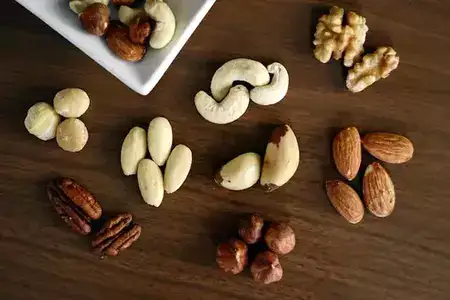Nuts are a great source of protein, healthy fats, fiber, vitamins, and minerals. They can help lower cholesterol, improve blood sugar levels, reduce inflammation, and protect against heart disease and diabetes.
But can nuts also cause bloating?
Bloating is a common digestive symptom that occurs when your stomach or intestines feel full and tight. It can be caused by various factors such as eating too much or too fast, swallowing air, food intolerances, hormonal changes, stress, or certain medical conditions.

In this blog post, we will explore whether nuts can cause bloating, the possible reasons why nuts can cause bloating, and how to prevent or reduce it.
Can Nuts Cause Bloating?
Yes, Nuts can cause bloating in some people because they contain fiber, phytic acid, tannins, and FODMAPs.
These are substances that can be hard to digest or can interfere with the absorption of minerals in the gut.
Also, read do smoothies cause bloating? Find out the truth now.
Why Nuts Can Cause Bloating?
There are several possible reasons why nuts can cause bloating in some people.
Here are some of them:
#1 Fiber
Nuts are high in fiber, which is good for your digestive health and regularity. However, if you are not used to eating a lot of fiber, it can cause gas and bloating as your gut bacteria ferment it.
This is more likely to happen if you eat nuts on an empty stomach or with other high-fiber foods.
To avoid this, you should increase your fiber intake gradually and drink plenty of water to help move it along your digestive tract.
#2 FODMAPs
Nuts contain certain types of carbohydrates called FODMAPs (fermentable oligosaccharides, disaccharides, monosaccharides, and polyols), which are poorly absorbed in the small intestine and can cause gas and bloating in some people with irritable bowel syndrome (IBS) or other digestive disorders.
FODMAPs are found in many foods such as fruits, vegetables, grains, legumes, and dairy products.
Some nuts have higher FODMAP content than others such as cashews, pistachios, and almonds.
If you have a FODMAP intolerance, you may need to limit or avoid these nuts or follow a low-FODMAP diet under the guidance of a dietitian.
#3 Phytic acid
Nuts contain phytic acid, which is an anti-nutrient that can bind to minerals such as iron, zinc, and calcium and reduce their absorption.
Phytic acid can also interfere with the activity of digestive enzymes and cause bloating and discomfort in some people.
To reduce the phytic acid content of nuts, you can soak them in water for several hours or overnight before eating them. This will also make them easier to digest and enhance their flavor and texture.
#4 Allergy or intolerance
Some people may have an allergy or intolerance to nuts or specific types of nuts. This can cause various symptoms such as itching, hives, swelling, nausea, vomiting, diarrhea, or anaphylaxis (a severe allergic reaction that can be life-threatening).
If you suspect that you have an allergy or intolerance to nuts, you should consult your doctor and get tested. You may need to avoid nuts completely or only eat certain kinds that you can tolerate.
How to Prevent or Reduce Bloating from Nuts
If you love nuts but don’t want to deal with bloating, here are some tips that may help:
#1 Eat nuts in moderation
Nuts are nutritious and delicious, but they are also high in calories and fat.
Eating too many nuts can cause weight gain and overtax your digestive system. The reasonable portion size for nuts is about a handful (about 28 grams or 1 ounce) per day.
You can also mix nuts with other foods such as salads, yogurt, oatmeal, or smoothies, to balance out their effects on your digestion.
#2 Chew well
Chewing is the first step of digestion and it helps break down the food into smaller pieces that are easier to digest.
Chewing also stimulates the production of saliva and digestive enzymes that aid in digestion.
When you eat nuts, make sure to chew them well until they are almost liquid in your mouth. This will prevent large chunks of nuts from reaching your stomach and intestines and causing gas and bloating.
#3 Drink water
Water is essential for hydration and digestion. It helps flush out toxins and waste from your body and prevent constipation.
Water also helps dilute the gas that is produced by the fermentation of fiber and FODMAPs in your gut. Drinking water before, during, and after eating nuts can help prevent or reduce bloating.
However, avoid drinking carbonated beverages or alcohol with nuts as they can worsen bloating.
#4 Try different types of nuts
Not all nuts are created equal when it comes to their effects on your digestion. Some nuts may cause more bloating than others depending on their fiber, FODMAPs, and phytic acid content.
For example, walnuts, pecans, and macadamia nuts have lower FODMAP content than cashews, pistachios, and almonds.
Peanuts are technically legumes and they have higher FODMAP content than most tree nuts.
You may need to experiment with different types of nuts to see which ones suit you best.
#5 Take digestive enzymes
Digestive enzymes are substances that help break down food into smaller molecules that can be absorbed by your body.
They are naturally produced by your pancreas and other organs but they can also be taken as supplements.
Taking digestive enzymes before eating nuts may help improve your digestion and reduce bloating.
However, you should consult your doctor before taking any supplements as they may interact with other medications or conditions.
Also, read does dairy cause bloating? And how to prevent and treat dairy bloating naturally.
Can Nuts Cause Digestive Problems?
Yes, nuts can cause digestive problems for some people. Raw nuts contain compounds such as phytates and tannins that can impair digestion by binding up minerals and preventing enzymatic reactions.
Nuts are also high in fiber and can be difficult to digest during a gastrointestinal flare-up.
Some people may have a nut intolerance that can cause symptoms such as bloating, gas, and discomfort.
Can Almonds Cause Bloating?
Almonds usually do not cause bloating, but consuming a lot of almonds can cause constipation, bloating, and upset your stomach due to their high fiber content.
If you increase your fiber intake, you can also increase your water intake to tackle the situation.
Which Nuts Cause Bloating?
Nuts that are high in fiber and/or a certain type of FODMAPs that some people cannot digest properly can cause gas and bloating.
These include almonds, cashews, hazelnuts, pecans, and pistachios.
Soaking nuts for at least 24 hours before eating them can help break down the phytic acid and prevent digestive issues.
How to Relieve Stomach Pain from Nuts?
Stomach pain from eating nuts can be caused by various factors such as difficulty digesting the fat, fiber and protein in nuts, having an intolerance or allergy to nuts, or consuming nuts that are contaminated with fungi.
There are a few ways to relieve stomach pain from eating nuts.
Some natural remedies for an upset stomach that may help include:
Do Cashews Cause Gas and Bloating?
Yes, cashews have the potential to cause gas and bloating in some people.
They are a food high in FODMAPs, which are potentially hard-to-digest carbohydrates that upset the stomach.
FODMAPs fermenting in the gut can cause a variety of digestive symptoms including bloating.
Do Peanuts Cause Gas and Bloating?
Yes, peanuts may cause gas and bloating in some people, especially if they eat too many. This is due to them being rich in fiber.
Peanuts may also contain oil, salt, and sugar, which can also cause gas in some people.
Summary
Nuts are a healthy snack that can provide many benefits for your health. However, they can also cause bloating in some people due to their high fiber content, FODMAPs content, phytic acid content, or allergy/intolerance.
To prevent or reduce bloating from nuts, you should eat them in moderation, chew them well, drink water, try different types of nuts
and take digestive enzymes if needed.
If you have any questions or concerns about how nuts affect your digestion, you should talk to your doctor or dietitian for advice.
The Bottom Line
I hope this blog post was helpful and informative for you and it helped you learn whether Nuts can cause bloating.
If you have any experience bloating with Nuts, feel free to share your experience in the comments below.
We would love to hear from you.
Thank you for reading and have a great day!




